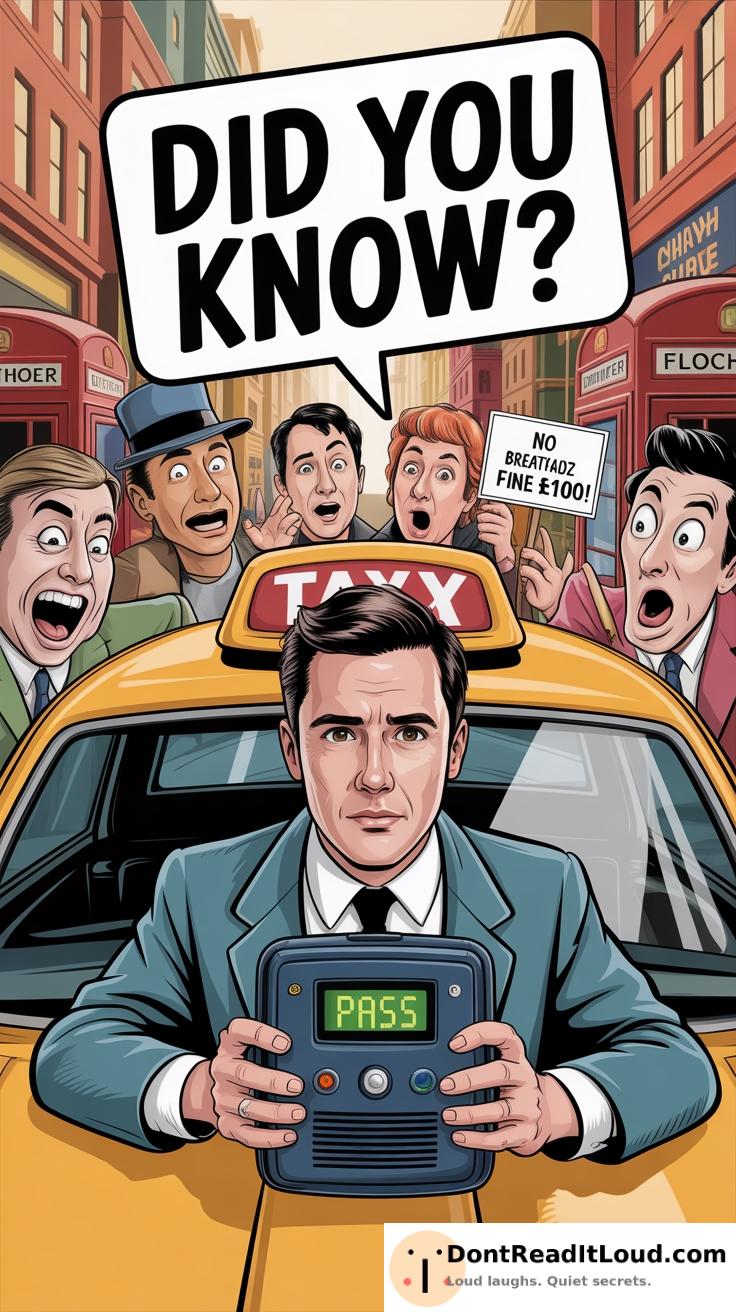
Did you know that in France, it’s illegal to drive without a breathalyzer in your car? This rule, introduced in 2012, encourages safer roads and personal accountability. Drivers are required to carry a certified device to check their own alcohol levels, aiming to prevent accidents before they happen. Forgetting to bring one can lead to fines, further promoting responsible driving habits. Interested in the impact of this law or what other countries might learn from it? Keep reading to find out more.
The Origin of This Law

The law requiring drivers to carry breathalyzers in their vehicles originated in France. Known as the “Alcootest” law, it was introduced to improve road safety and reduce alcohol-related accidents.
Implemented in March 2012 during Nicolas Sarkozy’s presidency, the law addressed concerns over the high number of accidents caused by drunk driving. France has long struggled with alcohol consumption and its effects on road safety.
Even with strict blood alcohol limits and tough penalties, earlier efforts didn’t sufficiently lower the rates of alcohol-related crashes.
Authorities were motivated by statistics indicating that many road deaths involved drivers over the legal alcohol limit. The government hoped that having a breathalyzer in every car would raise awareness and promote responsible driving.
This measure also fit within a wider European movement toward tighter road safety laws. France’s approach supported broader EU efforts to use technology in preventing drunk driving.
Initially, all drivers had to keep a certified breathalyzer in their vehicle, with fines for non-compliance. Later, enforcement of these fines was paused due to practical issues and public resistance.
However, the requirement remains as a way to encourage self-regulation and alcohol awareness among drivers.
Why This Law Exists

In the country where it’s illegal to drive without a breathalyzer, the law exists for practical, cultural, and political reasons.
Practically, the law aims to prevent drunk driving by requiring drivers to carry a breathalyzer. This encourages individuals to check their blood alcohol levels before driving, helping them make safer choices and potentially reducing alcohol-related accidents and deaths.
Culturally, the law highlights a strong commitment to road safety and responsible drinking. It promotes personal responsibility and emphasizes the role each person plays in protecting public safety. Societies are increasingly aware of the dangers of drunk driving, and laws like this support a culture that values safe roads.
Politically, the law responds to public calls for safer roads and stricter rules on impaired driving. It also follows international efforts to reduce drunk driving, enhancing the country’s reputation for prioritizing public health and safety. Introducing such measures helps leaders show dedication to reducing traffic accidents and protecting lives, which can boost public support.
How This Law Reflects it’s Culture?

The law requiring a breathalyzer in every car reflects several key cultural values and societal norms in countries like France:
- Emphasis on Safety: This regulation highlights a strong cultural focus on public safety and personal responsibility, especially on the roads. By making breathalyzers mandatory, the country demonstrates its dedication to reducing alcohol-related accidents and protecting its people.
- Collective Responsibility: Societies that implement this law often value the well-being of the group. The rule encourages individuals to play an active role in keeping the community safe, recognizing that drunk driving endangers everyone, not just the driver.
- Cultural Attitudes Towards Alcohol: Countries with this requirement may have longstanding relationships with alcohol or face current challenges around its use. The law acknowledges these realities and takes practical steps to manage risks, rather than prohibiting alcohol entirely.
- Preventive Approach: This measure shows a preference for prevention, dealing with issues before they become serious. Such a policy reflects a broader cultural habit of addressing problems early.
- Legal Compliance and Order: Requiring breathalyzers also demonstrates the importance placed on following laws and maintaining order. People are expected to respect rules designed for public good.
- Education and Awareness: The law acts as a constant reminder about safe alcohol limits while driving. It supports a culture that values education and encourages people to stay informed and accountable.
What Happens If You Break This Law?

In countries like France, where carrying a breathalyzer in your car is mandatory, breaking this law can lead to specific penalties. If you’re stopped without a breathalyzer, you may receive a fine, which is usually around €11 in France.
Penalties can increase with repeated violations or if you ignore previous warnings.
Although not having a breathalyzer doesn’t directly affect your driving record, repeated non-compliance may draw more attention from police. Insurance companies might also see frequent offenders as higher risk, which could impact your premiums.
Opinions about this law are mixed. Some believe it promotes safer driving by encouraging people to check their alcohol levels before driving. Others consider it an unnecessary rule or a minor inconvenience, especially if breathalyzers are hard to find or law enforcement is very strict.
Could Other Countries Learn from This Law?

The law mandating the presence of a breathalyzer in vehicles, as implemented in France, is a unique approach to addressing drunk driving. This regulation, introduced to reduce alcohol-related accidents, requires drivers to carry a breathalyzer kit in their vehicles at all times. The intent is to encourage self-testing before driving, thereby promoting road safety.
When comparing this law to how other countries handle similar situations, there are some notable differences and potential lessons:
- Prevention vs. Punishment:
- Many countries focus on punitive measures, such as hefty fines, license suspensions, or imprisonment for those caught driving under the influence.
- In contrast, France’s approach emphasizes prevention by making it easier for drivers to check their sobriety before getting behind the wheel.
- Accessibility and Awareness:
- The requirement to carry a breathalyzer can raise awareness about the risks of drunk driving and make it more convenient for drivers to monitor their alcohol levels.
- Other countries could adopt similar measures to enhance public awareness and responsibility.
- Cost and Implementation:
- The effectiveness of such a law may depend on the cost and availability of reliable breathalyzer kits.
- Countries with lower economic resources might find it challenging to implement a similar law unless affordable options are made available.
- Cultural Acceptance:
- The success of this law also hinges on cultural attitudes toward drinking and driving.
- In countries where social drinking is prevalent, the acceptance of carrying a breathalyzer might face resistance.
- Public education campaigns could help shift perceptions.
- Technological Integration:
- Some countries are exploring technology-based interventions, such as ignition interlock devices that prevent a vehicle from starting if the driver is over the legal alcohol limit.
- France’s breathalyzer requirement is a simpler, less intrusive alternative that other countries might consider.
- Legal Enforcement:
- Enforcement of this law is vital.
- France originally planned to issue fines for non-compliance, but this was later suspended.
- Other countries considering similar laws would need to establish clear enforcement mechanisms to guarantee compliance.
Conclusion: What Makes this Law So Unique
The law requiring drivers to carry a breathalyzer is a distinctive and strict regulation, reflecting the country’s proactive approach to road safety and alcohol use. This mandate, uncommon elsewhere, highlights the cultural importance placed on preventing drunk driving and encouraging responsible alcohol consumption.
By making it illegal to drive without a breathalyzer, the country stresses self-monitoring and accountability, setting an example that could shape global road safety standards.
What sets this law apart is its focus on individual responsibility and readiness, rather than relying only on police to prevent drunk driving. This requirement prompts drivers to stay aware of their blood alcohol content, which can help lower accident rates and save lives.
The rigorous enforcement also demonstrates the country’s strong commitment to public safety.
Other nations might benefit by adopting similar measures that give individuals the means to make safer choices. Such regulations could nurture a culture of responsibility and awareness, potentially reducing alcohol-related crashes.
This law provides a blueprint for addressing public health and safety concerns through innovative legal strategies that promote personal accountability.



